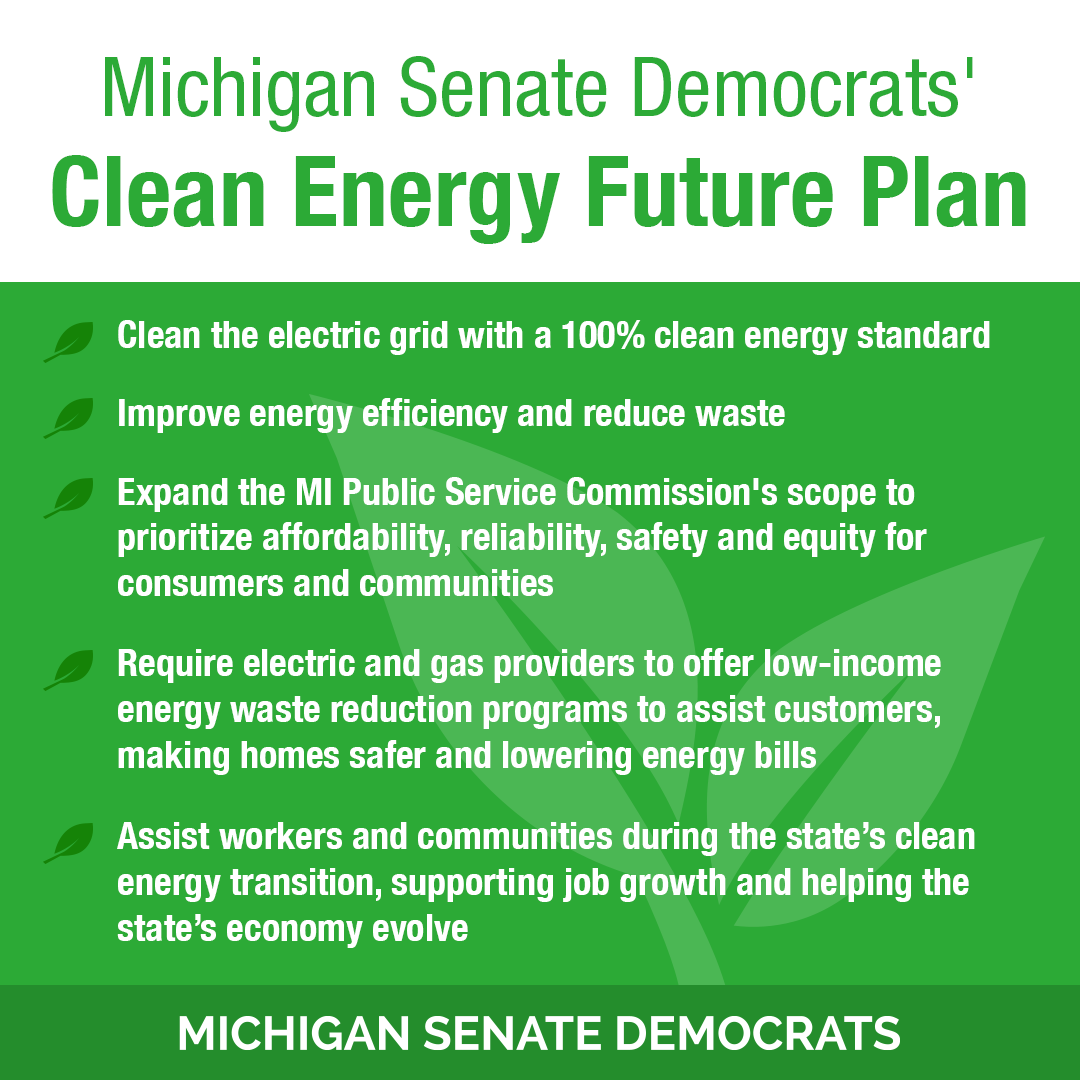Bills establish long-awaited clean and renewable energy standards, increase energy efficiency targets and increase oversight of renewable energy efforts
LANSING, Mich. (October 26, 2023) — After months of intensive work, the Michigan Senate took a significant step toward tackling climate change and creating a healthier, more sustainable environment for the state with today’s passage of the Clean Energy Future plan, Senate Bills 271, 273, 502. This legislation — spearheaded by Sens. Erika Geiss (D-Taylor), Sam Singh (D-East Lansing) and Sue Shink (D-Northfield Twp.) — will set long-awaited clean energy and renewable energy standards, increase energy efficiency targets and expand the role of the Michigan Public Service Commission (MPSC).
The plan also includes Senate Bill 519, sponsored by Sen. Singh, which would create the Community and Worker Economic Transition Office within the Michigan Department of Labor and Economic Opportunity. The new office will assist workers and communities during the state’s renewable energy transition, supporting job growth and helping the state’s economy evolve.
“This legislation is a major milestone in ongoing efforts to ensure a greener and more environmentally conscious Michigan,” said Sen. Sean McCann (D-Kalamazoo), Chair of the Senate Energy and Environment Committee. “These policies will safeguard public health and better protect our environment now and for future generations, and my colleagues and I will continue to work to address the climate crisis and combatting the harmful pollution that plagues our farms, air and Great Lakes.”
SB 271 sets ambitious but achievable targets for a clean energy future: Establishing a 100% clean energy standard set to be achieved by 2040, and an 80% clean energy standard by 2035. The legislation also establishes a renewable standard of 50% by 2030 and 60% by 2035.
“This legislation is long overdue to address our persistent and alarming climate crisis. It is evident that communities in Michigan, throughout the country and world are suffering from the effects of climate change,” said Sen. Geiss. “In Michigan, we are beginning to take bold action to address this urgent crisis. Clean energy legislation is crucial in combating the climate crisis to reduce greenhouse gas emissions and transition to renewable energy sources. There is no Planet B — and it is incumbent upon us to secure a clean energy future that ensures marginalized communities are not continually, disproportionately affected by environmental hazards — and that they have equal access to clean resources.”
SB 273 focuses on enhancing energy waste reduction (EWR) efforts. It requires electric utilities to achieve a minimum of 1.5% annual electric energy efficiency savings, with an additional incentive goal of 2% and over. The bill also sets the natural gas EWR target to 0.875% beginning in 2026 and provides for financial incentives for exceeding that target up to 1.25%.
“We’re prioritizing reliable, sustainable and cost-effective energy for Michigan families,” said Sen. Singh. “We’re establishing fair laws that ensure minimal carbon impact while also accessing federal funding to aid in our transition. This is a tremendous opportunity to address climate concerns, enhance energy reliability, lower costs for consumers and leverage federal resources in a thoughtful manner.”

The creation of a low-income EWR program is a new and noteworthy aspect of SB 273, borne out of work with stakeholders and the goal to ensure energy improvements benefit residents with the greatest needs. The program will have minimum expenditure requirements that ensure Michigan residents with low incomes or living in multi-family properties have equal access to energy efficiency programs.
“These bills are driven by the shared sentiment that energy should be affordable and reliable for all Michiganders,” said Senate Majority Leader Winnie Brinks (D-Grand Rapids). “Those values were our starting point and the result is powerful legislation that will make our electric bills more reasonable, our grid more dependable and our state a cleaner and more sustainable place to live.”
Lastly, SB 502 would require the MPSC to prioritize reliability, safety and resilience of utility systems as well as service quality, affordability, equitable access to programs, meeting plan requirements, overall cost-effectiveness and nondiscrimination. Additionally, the bill emphasizes the importance of public input and representation for utility customers, ensuring their interests are adequately addressed.
“In addition to requiring utilities to meet clean energy standards, by integrating equity into the regulatory process, we will enable the MPSC to evaluate the effects of power generation in communities impacted by environmental injustice,” Sen. Shink said. “These communities, often consisting of a higher proportion of people facing economic struggles and people of color, bear a disproportionate burden of pollution from power generation and are more susceptible to the adverse effects of climate change.”
These bills make significant and historic progress toward a sustainable future for Michigan and lay a solid foundation for continued work to improve Michigan’s energy industry and protect our air, land and water. The legislation’s passage demonstrates the commitment of the Michigan Senate Democrats to fostering environmental responsibility in the state and addressing the challenges posed by climate change.

Sen. Sam Singh (D-East Lansing) and Sen. Sue Shink (D-Northfield Twp.), two of the Clean Energy Future bill sponsors, speak with reporters following the Senate's passage of the momentous bills
